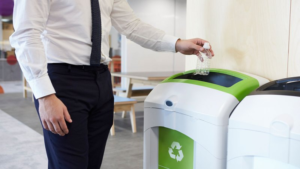Our enviromental courses
As the world of business has evolved and grown, society has used resources and generated waste with very little restraint. Whilst the economic growth of the U.K. has improved the livelihoods of many, as well as contributed to significant technological advances, we have drawn further and further away from a sustainable society. Climate change is not only a critical issue for future generations. The impact of global warming is felt by people who have lost their homes thanks to severe weather conditions, and those who do not have access to a clean water supply.
For a business to continue in an ethical manner, it must respect the planet by limiting its impact on the environment as much as possible. With the vast resources and influential reach of businesses, they have the capacity to make a real difference in the promotion and practice of environmental awareness. Businesses have a responsibility that extends beyond meeting the needs of customers. Sustainability in the business world means ensuring environmental, economic and social wellbeing for both current and future customers. This means considering the needs of the people and society without compromising the success or wellbeing of future generations.

How do companies affect the environment?
Research suggests that 75% of each person’s carbon emissions in the U.K. are from products and services. Businesses that provide services can have an environmental impact in many ways. Some examples include:
- Using consumables and equipment
- Consuming energy when providing a service, for example heating, lighting and computer networks
- Waste from work activities
Businesses that manufacture products also contribute to damaging the environment in several ways. For example:
- The raw materials used in manufacturing
- The manufacturing process that uses energy and can create by-products and emissions
- Transport and distribution of products by road, rail and air
- The lifespan of the product and how it is disposed of
Disposable nappies are an example of how a product’s lifespan affects the environment. Some diapers will not decompose for over 400 years. This means that, whilst most babies are toilet-trained by the time they’re three years old, their nappies will still be around for their own great-great-great grandchildren to use (although possibly not recommended).
Waste is a critical issue for all types of businesses, not just those in the nappy-manufacturing industry. Companies generate a lot of waste that is often difficult, or even impossible, to recycle properly. For example:
- Waste paper and cardboard
- Food and clinical waste
- Metal cans/containers and plastic or glass bottles
- Batteries and electrical equipment
- Aggregate (sand, rocks and soil)
According to a 2017 research study undertaken by the Department for Business, Energy & Industrial Strategy, ‘business’ specifically was responsible for 14% of the U.K.’s annual greenhouse gas emissions. Greenhouse gases, which include carbon dioxide and nitrous oxide, cause global warming, ozone depletion and acid rain. They also ruin air quality which is linked to poor quality of health. Companies contribute to this air pollution by using energy suppliers that rely on burning fossil fuels such as oil and coal, which release greenhouse gases. A lot of businesses are also reliant upon transport, as staff members travel to meetings or visit clients. Vehicles burn fuel which also emits greenhouse gases.
Why does this mean they are responsible for helping to protect it?
If businesses do not commit to executing their activities in a more sustainable and environmentally friendly manner, the supply of important metals and minerals will become less secure. These materials are crucial to many aspects of the economy and this poses an extra risk to businesses specifically as there will be increasing competition for resources.
There are also many financial reasons for businesses to commit to taking more responsibility to protect the environment. According to a study published by the Department for Education, Food & Rural Affairs in 2011, U.K. businesses could save around £23 billion per year by making simple changes to use resources more efficiently and help protect the environment. Therefore, resource efficiency is seen as an opportunity to achieve environmental benefits while also strengthening business resilience and decreasing costs. It also has the potential to contribute substantially towards government targets to reduce carbon dioxide emissions.
By aligning itself with strong values relating to environmental protection, companies will also strengthen their brand image and acquire more opportunities to market their business. Roberts Bakery is an excellent example of this. In 2018, the U.K.-based bakery business launched bread packaging that can be recycled in household kerbside bins. Even though most of the plastic packaging used for bread is labelled as ‘recyclable’, very few local authorities collect it as part of roadside services. In response to this problem, Roberts Bakery replaced the polypropylene plastic window with polyethylene terephthalate. As the U.K.’s first bakery to achieve 100% recyclable packaging, they have been awarded the prize for the best bread product of 2018 in the national competition run by The Grocer magazine. Their business will continue to grow alongside their attempts to progress in an environmentally sustainable manner. Clearly, Roberts Bakery are successful in marketing themselves as a values-driven company with a culture based on strong ethics.


